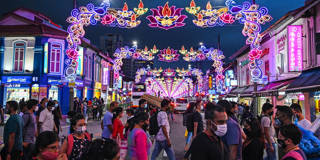There are many reasons for Singapore’s rapid growth over the past six decades, but its authoritarian regime is not necessarily one of them. Instead, the city-state’s economic miracle has more to do with its unique brand of multiculturalism and enviable social cohesion.
SINGAPORE – For economists, anthropologists, sociologists, and political scientists, Singapore represents a veritable laboratory of conundrums waiting to be analyzed.
In the pre-colonial era, this island of marsh and swamps served as a trading settlement, thanks to its relative proximity to the Malacca Strait. Traders from India and China passed through, with some deciding to stay and put down roots. Later, traders from the Netherlands and Portugal arrived. And then, the British came and brought laborers from India, Sri Lanka, and East Asia.
The mystique of Singapore extends even to its name. When the Buddhist prince Sang Nila Utama arrived in the late thirteenth century and founded a kingdom, he claimed to have seen a lion – he also claimed to be a descendant of Alexander the Great – and he named his domain Singapura, which in Sanskrit means “lion city.” Given that lions are not native to the region, the origin of the lion that Utama claimed to have seen remained a mystery until scholars realized that what he had seen was probably a civet, also known as musang, a distant cousin of the fox.

SINGAPORE – For economists, anthropologists, sociologists, and political scientists, Singapore represents a veritable laboratory of conundrums waiting to be analyzed.
In the pre-colonial era, this island of marsh and swamps served as a trading settlement, thanks to its relative proximity to the Malacca Strait. Traders from India and China passed through, with some deciding to stay and put down roots. Later, traders from the Netherlands and Portugal arrived. And then, the British came and brought laborers from India, Sri Lanka, and East Asia.
The mystique of Singapore extends even to its name. When the Buddhist prince Sang Nila Utama arrived in the late thirteenth century and founded a kingdom, he claimed to have seen a lion – he also claimed to be a descendant of Alexander the Great – and he named his domain Singapura, which in Sanskrit means “lion city.” Given that lions are not native to the region, the origin of the lion that Utama claimed to have seen remained a mystery until scholars realized that what he had seen was probably a civet, also known as musang, a distant cousin of the fox.